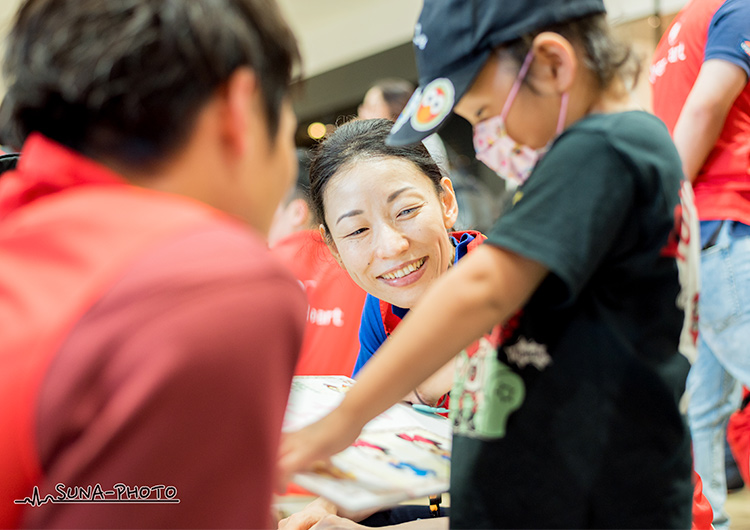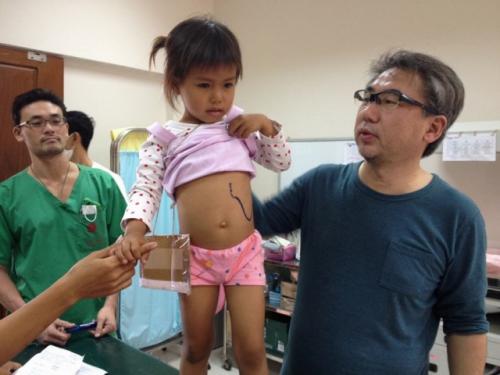Helping Children Fight Paediatric Cancer
The SmileSmilePROJECT
The SmileSmilePROJECT supports paediatric cancer patients and their families by facilitating special memories for both patients and their families. Although unconventional, the medical field can play a significant role in this endeavour.
Haruna Yoshioka
Paediatrician and Project Leader

The SmileSmilePROJECT aims to take families on a trip that they will remember forever. Our doctors and nurses ensure that families who are anxious about leaving home and traveling while their child undergoing treatment, can enjoy themselves to the fullest. SmileSmilePROJECT is a program for the families of children under the age of 18 who are currently undergoing treatment or who have completed treatment in the last 12 months. To ensure that travel is in the best interest of the patient, a copy of doctor approval needs to be obtained.
Depending on the condition of the patient, one of our doctors or nurses will accompany the family on their outing or trip.
Japan Heart supports the entire travel costs for the patient which includes round trip transportation, hotel accommodation, and rental medical equipment for our accompanying medical personnel. Please note that we ask family members to pay for their own travel costs.
We support day trips as well as domestic travel with a maximum stay of 2 nights. Please note that the acceptance provisions and itinerary for each event we organise may vary.
Patient and Family Voices
A 16 year old girl who has gone through a brain tumour and leukaemia and joined Kids Seminar says:
“At the Kids Seminar and Coffee Seminar, I had a great time doing things I could not do normally. Since there were so many volunteers and medical staff around us who came to help when needed, I really felt safe and I was able to try and experience so many different things. Everyone was so nice. They always talked to me and asked how I was feeling. That made me feel safe and I was able to join these seminars without worrying too much about my health.”
We also heard from a family whose 10 year old daughter is under treatment for a brain tumour:
“With the help and support from your staff and volunteers, we really had a great time together. That trip changed us. We have decided to become more active and to go to places where we can put a smile on our daughter’s face. This experience gave us courage and we now think more positively that the cancer can be beat. Thank you very much! We want to join your event again!
A message from the family of a 5 year old boy with brain tumour who attended KidZania Koshien and KidZania Tokyo Special Event:
“It was exactly 2 weeks after our son left the hospital and the timing was absolutely perfect to celebrate something with him. Since your nurse and staff came with us and there is an on-site body check, we were able to enjoy the events all day without worrying too much about anything. Also, it was really good for him to know that there are other children out there who are fighting their own medical challenges. Thank you very much for this great occasion.”
Paediatric Cancer in Asia

Unfortunately, there are no accurate paediatric cancer statistics for Asian countries. However, if the cancer risk rate in the region is the same as what we see in Japan, more than 10,000 children in Myanmar, Cambodia, and Laos would need paediatric cancer treatment annually.
What is paediatric cancer?
Paediatric cancer is a general term for various types of cancer that children under the age of 15 develop. Some of the more common paediatric cancers are leukaemia, brain tumours, neuroblastoma, and lymphoma. In Japan, 2,500 children contract paediatric cancer each year, which corresponds to the equivalent of 1% of adult cancer risk rates. This seems low, but we cannot ignore this disease, as paediatric cancer is the second leading cause of death following fatal accidents of children over the age of one. Compared to the 1970s, the number of deaths from paediatric cancer has decreased in Japan. Unfortunately, this is simply a direct result of the declining Japanese birthrate while the risk rate of paediatric cancer incidence has remained the same.
Unlike cancer in adults, paediatric cancer is unlikely to be caused by lifestyle or environmental factors. Rather it is likely to be caused by genetic factors or chance anatomic abnormalities that occurred in the womb.
Treatment results are promising. With the development of various types of treatment and research on the nature of cancer cells, 80% of paediatric cancer can now be cured. Though many cases have become curable, there are still risks for complications that are believed to be caused by the treatment themselves. Dosage, types of anticancer drugs, and the level of radiation therapy may cause complications in the patient’s life later on. Effects on height growth, cognitive ability, organ functions, future pregnancy, and patients’ offspring are some examples of late complications.
Through these activities, we support paediatric cancer patients and their families, home and abroad.
- Our medical staff accompanies the child and family in outings and travels.
- Children with paediatric cancer are invited to events specifically organised in places like KidZania, Tokyo Disneyland, or one-day medical staff workshop experiences.
- Medical staff can participate in our programs nationwide through volunteer registration.
- Paediatric cancer education is promoted through general volunteer registration.
- The right kind of social recognition for paediatric cancer survivors is promoted and communicated.
- The opening of a paediatric medical centre in Cambodia which functions as a hub hospital for Asian developing countries that engages in diagnoses and treatment of paediatric cancer.
Your Support
We would like to ask for your generous support to continue SmileSmilePROJECT and make it possible for us to help as many children as possible.
● One-time donation
● Your donations can be made to;
Name of Beneficiary Bank: Sumitomo Mitsui Banking Corporation
Branch: No.097 ,Kamatanishi Branch
Street Address: 5-41-8 Kamata, Ota-ku,
City and State/Province/District: Tokyo
Country: Japan
Bank Telephone #: +81-3-3732-3811
Account Number: 2002744
Account Name: JAPAN HEART
SWIFT code: SMBCJPJT
Corporate Sponsors
Johnson & Johnson CSR Committee
Shin Nihon Seiyaku Co., Ltd
Sysmex Corporation
The Medtronic Foundation

